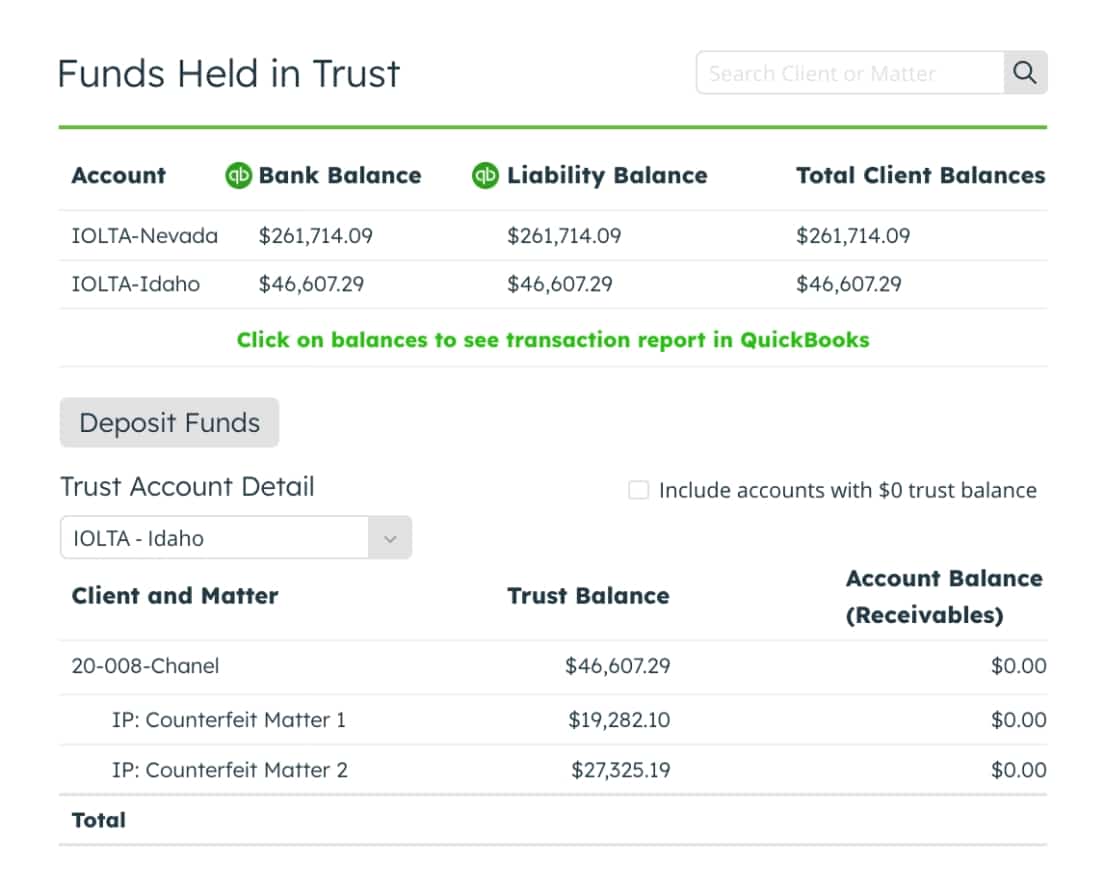
Every law firm is going to need some sort of practice management system in place.
Unfortunately, some firms still think they can get by on the bare minimum, such as just using Excel spreadsheets and/or Google sheets for all their time tracking and matter management, though this has proven to be incredibly inefficient, inaccurate and time consuming.

Key Takeaways
- In the past, law firms had no choice but to choose all-in-one law practice management software systems when they were implementing new software into their firm’s daily operations.
- More recently, firms have found that there are alternatives to the traditional practice management software systems and that they can create more customized management systems that work with their specific law practice’s needs.
- Legal accounting software continues to be a significant area where law firms still ask for specific types of software to help them organize and keep track of the wide array of accounting responsibilities that most law firms have.
In today’s busy and competitive market, a successful law firm is going to need something more elaborate that allows their busy firm to maintain good document management, task management and matter management in general.
In either case (and all cases in between!) the days of a legal pad and a handheld calculator are gone. Your firm will need to implement some sort of practice management software. But the question is: “How much?”
In the past few decades, it has become quite common for law firms to feel they had to invest big money and tons of training time into implementing legal practice management software into their firm in order to meet the best practices of the industry.

But – thanks to advanced technology and new players in the law practice management market, this is simply no longer the case.
Instead of having another law practice management software company come and tell you why you need their software product, let’s instead start by looking at what you don’t need.
The vast majority of law firms already have some pretty stellar software systems in place – software systems that their attorneys and staff like to use and that are completely adequate in getting the tasks at hand done.
Before you decide to sign on the dotted line with a large law practice management software company, spend a few minutes looking over the list below and determine if you really need all those “bells and whistles” the practice management software legal company is supposedly offering you.

Do You Have an Effective Client Communication System in Place?
From the first phone call or email to the last, client communications is the bedrock of having a strong relationship with your clients.
Not only that but even in today’s advanced technology age, word of mouth is still one of the most popular ways that law firms gain new contacts and clients, so making sure that your current clients are pleased with your professionalism and communication style is going to be a key component of your long-term success.
One of the most common ways that attorneys and their legal staff communicate with clients is through the use of email.
Email communication is not only a great way to ask questions or respond to them, but it is also useful for sending or requesting documents as well as sharing information that is relevant to a case.
And, unlike a phone call or even in-person meeting, email correspondence will immediately serve as a paper trail for both you and your client, should there ever be confusion or concern about something that was discussed and needs to be revisited.
For most law firms (even small sized ones) email correspondence has become a regular part of everyone’s daily operations and most firms have figured out a way of managing their inboxes that makes sense to the attorneys and the staff members that utilize them.
A commonly used form of contact management for many law firms is Outlook. Outlook in Office 365 is a well-designed email program that can be set to download your messages straight on to the computer or any device onto which its installed.
It is also a great client information manager with an address book, a calendar, a to-do list, and much more.
Let’s say you’ve decided to purchase new practice management software because it has good case management capability, but its contact management (emails, documents, etc.) is a huge pain and can’t be integrated with your well-loved Outlook program that you are already using.
If this is the case, you will soon find that you will have to make a choice between continuing to use Outlook and ignore the new contact management software, or try and use the new software, even if you find it complex and cumbersome to use.
This means that you (and your staff) will either find yourselves struggling and being frustrated with the new software program’s contact management system, or you won’t use it, which means your entirely new all-in-one system will be out of alignment.
And being out of alignment with your new legal practice management software also means being out some cash, since you’ve now purchased a practice management software system that you are not using to its full potential.

An alternative approach to this problem would be to purchase a la carte legal practice management software instead of an all-in-one system.
The a la carte or “best-in-breed” software approach will allow your firm to have a more customized control over what you actually need and what is going to work best for you.
Schedule a demo
So, it would not behoove a practice with a working email system to be encouraged to move away from that system and begin to integrate something different into their client management system, right?
But…this is exactly what happens with many of the traditional law practice management software systems that a vendor tries to suggest for your practice.
Don’t be intimidated by a seemingly more sophisticated practice management software system that tries to convince you there is a better or more efficient way of handling the way you currently connect and communicate with your clients.
If the system you have in place is working for you, then by all means find alternative software that can meet your practice management needs without forcing you to change how you receive client intake information or communicate with current or prospective clients.

Do You Have an Effective Document Management and Document Storage System in Place?
Another significant feature that many all-in-one legal practice management software cloud systems tout as a big selling point to their systems is centered around document management and document storage capabilities.
All legal professionals know that legal files are the lifeblood of all law firms. Every document that’s received and every piece of correspondence that is related to a client’s case management must be accounted for and easily accessible by anyone who is working on the case.
Not only that, but confidential and sensitive legal documents must be stored securely, and safeguards should be put in place to ensure that there is no possibility for unauthorized access to be given nor for documents to be lost, stolen or misplaced.
This is why it’s essential that law firms have an efficient document management system from day one of operations.
But like with client communication and client information, oftentimes a law firm already has a solid document storage system in place, even before they begin to consider adopting an all-in-one legal practice management system.
And for many of those law offices, the document storage system they already have in place uses platforms they are already familiar with, such as Google and Microsoft.
Up until about a decade ago, platforms like Google and Microsoft weren’t equipped to handle the level of legal document management that most law firms require.
Today they are more than equipped, with real-time editing, document assembly and ways to easily access documents that is also highly secure.
Thus, the question then becomes…if you are already using these types of software apps in your law firm and you enjoy them, why would you switch?
One of the biggest downsides law firms report with adopting all-in-one legal practice management software is that the migration of documents from an original software app to a new one can be incredibly time consuming, tedious and cumbersome.
There is also a high potential for human error when transferring a firm’s documents from one platform to another.
Legal practice management systems are designed to make your legal team feel like they have more time on their hands and not less.
A good practice management system should also increase your firm’s storage security and accuracy, not cause increased reasons for concern.
As with your client management system, you should not feel as though you have to migrate your documents into a new system if the one you have now is working fine for you.

What is a Good Tech Stack for Most Law Firms?
If you know you’d like to upgrade or introduce certain software into various departments of your firm, but you don’t know where to start, LeanLaw can help.
You’ve done the hard work of figuring out what you don’t need. Now let’s help you focus on what you do.
Legal Accounting Tech Stack: The Best Law Practice Management Option for Your Firm
Out of the dozens of regular tasks that a law firm must perform, legal accounting is probably the most complicated.
From sending accurate invoices and capturing billable time to staying on top of online payments and trust accounting regulations, the accounting department in your firm has a wide range of tasks that must be completed and often need to be checked for compliance as well.
This means that – unlike contact communication or document storage – legal accounting will need its own separate software platform from which to operate effectively.
LeanLaw can offer your firm exactly that.
Designed to work in conjunction with QuickBooks Online accounting software, LeanLaw delivers clear and detailed compensation reports as well as expense tracking when you need them.
And because of the synching capabilities of both LeanLaw and QuickBooks Online, everything you or anyone else in your firm is looking at is being done in real time.
Schedule a demo
You can also send invoices, track payments, automate workflow and reconcile bank statements as soon as they are available. Because everything is automated, there is little to no need for manual busy work.
In fact, most lawyers who use LeanLaw update their invoices themselves without the need for an assistant’s help!
If you like the idea of creating your own customizable best in breed tech stack, then consider requesting a free demo from LeanLaw today and find out how our team can help you get the exact tech stack your law firm needs.
For example, at LeanLaw we have Onboarding Specialists who will always help to make sure you get off on the right foot, from the migration of any documents to helping you connect workflow. Not only that, but our Customer Success team will always be there to make sure you and your staff are feeling confident with the software and are on track.
Our expert staff is made up of legal professionals who grew tired of the past models of legal practice management software and wanted to create something different…something that would focus on the areas where most law firm’s need customized software help.
And leave alone the areas that don’t.
Ready to give LeanLaw a try? Reach out to us today!





